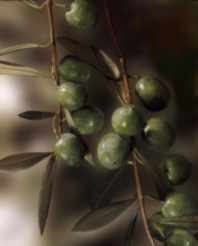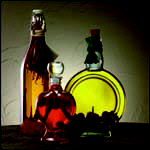|
Past and Present significance
of Olive in Jewish Life
To celebrate the great
miracle of Chanukah, particularly the miracle with the cruse of oil (which
lasted for eight days of Chanukah instead of one), we kindle the Chanukah Lamp
during the eight days of Chanukah, using olive oil (though other oils or fats
may also be used & candles have become more in vogue now).
It will therefore be
timely for us to have a talk about the olive tree and especially olive oil
which it produces.
The home of the olive
tree is in the lands surrounding the Mediterranean Sea: the Land of Israel,
Greece, Italy, Spain, Morocco, Tunisia, etc. The history of the olive tree
dates back to the dawn of the history of mankind. We all remember the story of
the Flood, when Noah sent out a dove from the Ark in order to see whether the
waters of the Flood had receded. The dove came back with a leaf of an olive
tree in its mouth.
 For
the people who live in the above-mentioned countries, the olive tree has been
of great importance, both because of its fruit and the oil that it produced.
Olive oil has been used for food, medicine, and light. Like all fats, olive
oil is a high-energy food, and those who could afford it also used it for
perfume and as a soap. The ancient Romans used to say that the two most
important liquids for good living were wine and olive oil: wine -to take
internally, and olive oil-externally, to rub the body with. For
the people who live in the above-mentioned countries, the olive tree has been
of great importance, both because of its fruit and the oil that it produced.
Olive oil has been used for food, medicine, and light. Like all fats, olive
oil is a high-energy food, and those who could afford it also used it for
perfume and as a soap. The ancient Romans used to say that the two most
important liquids for good living were wine and olive oil: wine -to take
internally, and olive oil-externally, to rub the body with.
In Jewish life olive oil
had a special significance, because it was used to light the sacred Menorah,
as mentioned above, and also to anoint the King and the Kohen-Gadol (High
Priest).
The fruit of the olive
tree is very rich in oil. When the olive is ripe, about half of its flesh
consists of oil.
The olive tree, when it
is laden with fruit, is a beautiful sight. The shining purple-black fruit amid
the silvery green leaves gives the olive tree a delightful appearance. It has
been a favorite object of artists and painters throughout the ages.
The olive tree lives
longer than most fruit trees. There are olive trees in the Holy Land which may
be 2,000 years old, dating back to the time of the (Second) Beit Hamikdash The
tree likes a hot and dry climate, and a moderate supply of water at the right
season. Another wonderful aspect of the olive tree is that parts cut from it
will rapidly take root and grow into new trees.
 The
fruit has a pit. The ripe fruit is purple to black in color. However, before
it is fully ripe, it is green, and that is when the olive is usually picked
from the tree. The olives may be processed so as to retain their olive-green
color, or allowed to change color after it has been picked. In that case, it
is kept in buckets for some time. At the plant, the fruits are graded, washed
and treated to remove the bitter substance, which the fruit contains when it
is picked from the tree. It is then canned and sterilized for eating. The
fruit has a pit. The ripe fruit is purple to black in color. However, before
it is fully ripe, it is green, and that is when the olive is usually picked
from the tree. The olives may be processed so as to retain their olive-green
color, or allowed to change color after it has been picked. In that case, it
is kept in buckets for some time. At the plant, the fruits are graded, washed
and treated to remove the bitter substance, which the fruit contains when it
is picked from the tree. It is then canned and sterilized for eating.
The method of obtaining
the oil from the fruit has a variety of processes. The olives are first
crushed into pulp, and the pulp is then put under considerable pressure in
order to squeeze out the oil. The oil is then filtered through woolen cloth
and stored in tanks for about twenty-four hours. This allows the oil to
settle, and the sediment is then drawn off from the bottom of the tank. Next
the oil is run into other tanks lined with tin or glass. Here the oil is
allowed to settle for two to five months. During this period the sediment is
drawn off several times.
Timely picking of the
fruit is very important for the quality of the oil. The best oil comes from
fruit that is picked just after it is ripe and before it turns black. When the
skin of a ripe olive is broken, a great deal of the oil comes out from the
fruit. Such oil is the highest grade of olive oil called "sublime"
or "first expressed" oil. This is the type of oil that was
exclusively used for the Menorah.
 Altogether
about 1,400,000 tons of oil is produced every year in the world at large.
Spain and Italy are the leading olive-producing countries, followed by Greece
and Tunisia. The Spaniards brought the olive tree to America and it reached
California in 1769. The olive tree developed well in California and certain
parts of Arizona. However, the American olive is not as rich in oil as the
European olive The production of olive oil is limited in America not only by
climatic conditions, but also because of the fact that it entails a great deal
of manual labor, which is quite expensive here. California produces about
50,000 tons of olives annually, half of which goes into cans in the form of
pickled olives, while the other half is turned into oil. In addition, the U.S.
imports around 15,000 tons of olive oil every year, besides large quantities
of pickled olives, mostly from Italy and Spain. Altogether
about 1,400,000 tons of oil is produced every year in the world at large.
Spain and Italy are the leading olive-producing countries, followed by Greece
and Tunisia. The Spaniards brought the olive tree to America and it reached
California in 1769. The olive tree developed well in California and certain
parts of Arizona. However, the American olive is not as rich in oil as the
European olive The production of olive oil is limited in America not only by
climatic conditions, but also because of the fact that it entails a great deal
of manual labor, which is quite expensive here. California produces about
50,000 tons of olives annually, half of which goes into cans in the form of
pickled olives, while the other half is turned into oil. In addition, the U.S.
imports around 15,000 tons of olive oil every year, besides large quantities
of pickled olives, mostly from Italy and Spain.
Turning back to the Holy
Land, we all recall that it was praised in the Torah as the "Land of
olive oil and (date) honey" The olive is also one of the five fruits with
which the Land of Israel was praised, the others being grapes, figs,
pomegranates and dates.
In olden days the
production of olive oil was very important, and large quantities of it were
sold to merchants from neighboring countries. The Tribe of Asher was
particularly rich in olive oil. Olives grew in abundance on the slopes of the
Judean Mountains and in the Galil. Near Jerusalem there is also the famous
Mount of Olives. However, in the course of time, when most of the land lay in
ruins, a great deal of the olive growths have been destroyed or neglected. At
present, the export of olive oil from Eretz Yisrael amounts to about 500 tons
a year, which is about 25 percent of the value of all the oils and fats
exported. But the total value of oils of all kinds exported does not amount to
more than 1 percent of the value of all exports.
Because of the importance
of the olive as a fruit and as a source of oil, and because of the special
characteristics of the olive tree, being always green and fresh, etc,. our
Prophets and Sages often used the olive tree as a symbol of the Jewish people
and Jewish life. The truly blessed Jewish home of the God-fearing man is
described as a happy family, where the wife is like a "fruitful
vine" in the house, and the children are like "olive plants"
around the table. (Psalms 128: 3).
The Jewish nation as a
whole has been likened by the Prophet Jeremiah to an evergreen olive tree
because, like the olive tree, the Jewish people is a source of light to all (Shemot
R. 36).
Oil does not mix with
other liquids, and rises to the top. So- our Sages observe-does the Jewish
people not mix with other nations, and comes out on top (ibid.)
The olive produces its
oil only under pressure; so does the Jewish people repent through suffering
(Men. 53b). It is worthy of note that precisely during the bitter Galuth
(exile) and under most in-human persecution, the Jewish people produced the
Talmud Babli, the Shulchan Aruch, and the vast Rabbinic literature.
Above all, the Torah and
Mitzvot themselves are likened to oil, because they are the source of true
light in the world. (Devarim R. 7; Kohelet R. 9; etc.).
The "olive" and
"oil" qualities of the Jewish people particularly came to light in
the dark days of Syrian oppression in the days of Mattityahu and his sons. The
Jewish people faced mortal danger at that time both from within and without.
The wicked Antiochus tried to extinguish the light of the Torah and Mitzvot by
force. His armies invaded the Holy Land, and tried to convert the Jewish
people to the Greek pagan way of life. They desecrated the Beit Hamikdash and
put out the light of the Menorah. Within the Jewish people there was a
movement of assimilators who preached the mixing of Judaism with Greek
"culture." But at the height of the religious persecution, the
Jewish people rose under the banner of Mattityahu and his sons. They threw out
the Greek oppressors and their followers, rededicated the Beit Hamikdash
(Temple), and rekindled the Menorah with pure and sanctified olive oil. The
purity and holiness of the Jewish people and their own way of life were once
again firmly reestablished.
Through the "miracle
with the oil" (the small quantity of undefiled oil lasting for eight
days, until new oil could be prepared) God joined His faithful children in
showing to the whole world that the pure light of the Torah and Mitzvot must
continue to shine forth without interruption, and that there is no power on
earth that can put out the light of the Torah, and of the Jewish people.
|